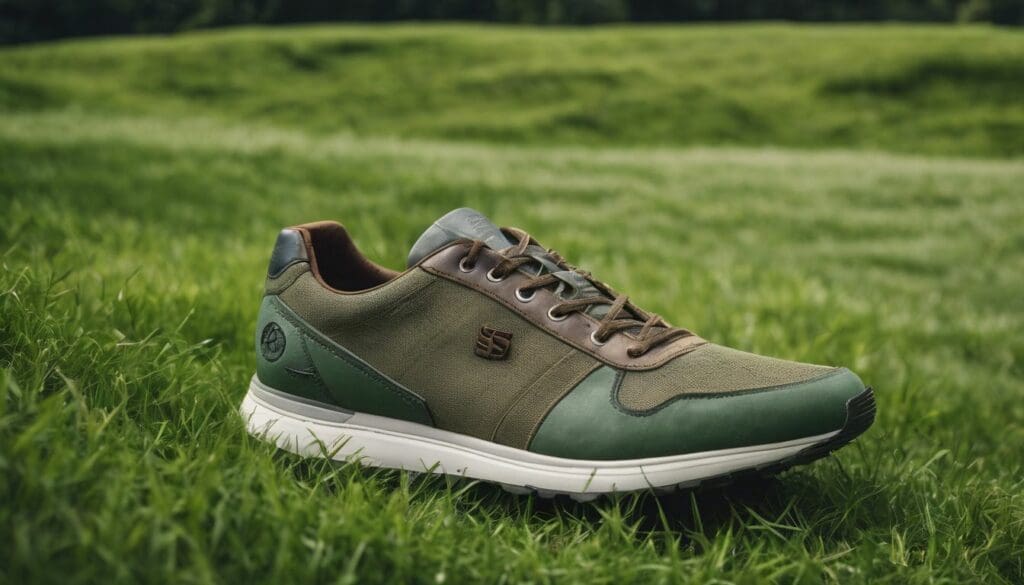Selecting the perfect pair of shoes entails more than simply keeping up with the latest fashion; it also involves considering the welfare of our beautiful planet. Like many others, perhaps you’ve shared in the collective struggle to source footwear that treads lightly on Mother Earth.
Fear not, for we’ve thoroughly explored the realm of sustainable shoe options. Let this guide be your trusted companion in making eco-friendly strides. Step into a brighter future with us as we embark on a journey towards more environmentally conscious choices for your feet – and our world.
Key Takeaways
- Seek footwear made with recycled or organic materials such as hemp, organic cotton, and natural rubber to minimise negative environmental impact.
- Choose eco – friendly leather alternatives like pineapple leaf fiber (Pinatex) and cork to support animal welfare and reduce waste production.
- Look for shoes produced by brands that follow ethical manufacturing standards, ensuring fair wages and safe conditions for workers.
- Check for sustainability certifications like Global Organic Textile Standard (GOTS) to confirm the use of eco-conscious materials in your shoes.
- Support sustainable fashion by selecting brands committed to reducing their carbon footprint and promoting a healthier planet through responsible practices.
What Are Sustainable Shoes?
Sustainable shoes are footwear that is made from eco-friendly and ethically sourced materials. They are designed and manufactured with minimum negative impact on the environment, such as using recycled or organic materials and adhering to ethical production standards.
Definition of sustainable footwear
Sustainable footwear steps beyond stylish design to embrace eco-friendly practices. It involves creating shoes with minimal impact on our planet, using materials that are either recycled or sourced responsibly.
Think of vegan shoes made from plant-based resources or traditional styles reinvented with organic cotton. Ethical shoe brands focus on each step of the process, from environmentally friendly tanning and dyeing processes to fair trade production standards.
These green shoes aren’t just about looking good; they represent a commitment to conscious consumerism and ethical consumer choices. We prioritise protecting the environment while ensuring that workers along the supply chain receive fair treatment and wages.
Knowing what makes footwear sustainable leads us directly into why embracing this concept is crucial for both our wardrobes and our ecosystems.
Importance of sustainable fashion
Sustainable fashion plays a significant role in reducing the environmental impact of the fashion industry. By choosing eco-friendly and ethically produced clothing, we contribute to a more sustainable future for our planet.
Opting for sustainably made footwear supports ethical consumerism and helps to reduce carbon footprint, ultimately leading to positive environmental outcomes.
When we prioritise sustainable fashion, we align our values with our purchasing choices. By supporting brands that are committed to producing environmentally responsible footwear, we encourage the wider fashion industry to follow suit.
This shift towards sustainability not only benefits the environment but also empowers us as conscious consumers who value ethical production practices and eco-friendly materials in the products we choose.
How Can Shoes Be Sustainable?
Shoes can be sustainable through the use of eco-friendly materials such as organic cotton, recycled polyester, and natural rubber. Ethical manufacturing standards also play a crucial role in ensuring sustainability in footwear production.
Materials used in sustainable shoes
Sustainable shoes are made from a variety of eco-friendly materials to reduce environmental impact. Here are some commonly used sustainable materials in footwear:
- Organic Cotton: Grown without synthetic pesticides and fertilisers, it reduces environmental damage and water usage.
- Recycled Plastic: Repurposing plastic bottles or other waste materials into shoe components helps minimise plastic pollution.
- Cork: Harvested from the bark of cork oak trees, this renewable material is both lightweight and durable.
- Hemp: A fast-growing plant that requires minimal water and no pesticides, making it an eco-friendly choice for shoe production.
- Bamboo: Known for its rapid growth and natural antibacterial properties, bamboo is a sustainable alternative to traditional shoe materials.
- Natural Rubber: Derived from rubber trees, this material offers elasticity and resilience without causing harm to the environment.
- Pineapple Leather (Pinatex): Made from pineapple leaf fibres, it provides a cruelty-free alternative to traditional leather while promoting agricultural sustainability.
- Vegetable-Tanned Leather: Utilising natural tannins from plants instead of toxic chemicals, this method minimises environmental impact in the leather tanning process.
Ethical manufacturing standards
When choosing sustainable footwear, it’s crucial to consider the ethical manufacturing standards used in production. Look for brands that prioritise fair trade practices, ensuring that workers are treated ethically and paid fairly throughout the supply chain.
Supporting companies that value ethical manufacturing helps promote a more sustainable and socially responsible fashion industry. This ensures that your eco-conscious footwear choices align with your values of promoting environmental conservation and supporting fair labour practices.
Opting for shoes made by brands with transparent and ethical manufacturing standards can significantly contribute to reducing negative social and environmental impacts associated with traditional shoe production.
Benefits of Sustainable Shoes
Choosing sustainable footwear not only reduces your carbon footprint but also minimises waste production, contributing to a healthier environment. Additionally, opting for eco-friendly shoes supports ethical and environmentally responsible practices in the fashion industry.
Reducing carbon footprint
Choosing sustainable footwear reduces our carbon footprint by opting for materials and production methods that have a lower environmental impact. Using recycled materials, such as rubber or plastic, contributes to reducing waste while also lowering the energy required for manufacturing new materials.
Additionally, selecting shoes made from organic or sustainably sourced materials decreases the overall greenhouse gas emissions associated with conventional shoe production processes.
By supporting ethical and sustainable brands that focus on eco-friendly designs and fair trade practices, we are making conscious consumer choices that positively impact the environment.
Less waste production
When selecting sustainable footwear, opt for brands that prioritise less waste production. Seek out companies that use innovative techniques like upcycling and recycling materials to reduce the environmental impact of shoe production.
By choosing shoes from these environmentally responsible brands, you can actively contribute to the reduction of waste in the fashion industry while still enjoying stylish and durable footwear made with minimal impact on the planet.
Opt for shoe designs that are consciously crafted with reduced waste in mind. Look for options made from recycled materials or with an emphasis on recyclability at the end of their lifecycle.
Environmental benefits
Choosing sustainable footwear has numerous environmental benefits. By opting for eco-friendly materials and ethical manufacturing standards, you can significantly reduce your carbon footprint.
Sustainable shoes also contribute to less waste production, which helps in preserving our environment. Moreover, selecting shoes made from recycled or organic materials supports the reduction of resource extraction and minimises the impact on ecosystems.
Additionally, investing in environmentally friendly footwear encourages the use of alternative materials to leather that are less harmful to the environment. This not only promotes sustainability but also reduces the demand for traditional leather production, which has a significant environmental impact.
How to Choose Sustainable Footwear
Look for shoes made from recycled materials, such as plastic bottles or old sneakers. Consider options using organic materials like cotton, hemp, or bamboo. Seek out eco-friendly leather alternatives and check for certifications that ensure ethical and sustainable production practices.
Look for recycled materials
When choosing sustainable footwear, consider looking for options made with recycled materials. Recycled materials in shoes can include things like reclaimed rubber, recycled polyester, or repurposed plastic.
By opting for shoes made with recycled materials, you’re supporting the reduction of waste and the conservation of resources. Additionally, this environmentally friendly choice helps to decrease the demand for new raw materials and limits pollution associated with production processes.
Incorporating elements made from recycled materials not only showcases innovation and creativity but also demonstrates a commitment to sustainable practices. When seeking eco-friendly footwear options, keep an eye out for brands that utilise recyclable components in their shoe designs as it aligns with our ethos of environmental responsibility and supports conservation efforts.
Consider organic materials
When choosing sustainable footwear, consider organic materials such as organic cotton, hemp, or sustainably harvested natural rubber. These materials are grown without synthetic pesticides and chemical fertilisers, reducing the environmental impact of their production and minimising harm to ecosystems.
Organic materials also tend to be biodegradable, further lessening their contribution to waste accumulation.
Opting for shoes made from organic materials supports environmentally responsible farming practices while promoting soil health and biodiversity. By prioritising products crafted with these eco-conscious resources, we can actively contribute to the preservation of our planet’s natural resources and habitats.
Eco-friendly leather alternatives
When choosing sustainable footwear, consider eco-friendly leather alternatives. Look for shoes made from materials such as pineapple leaf fibers, cork, or apple peels. These options provide a cruelty-free and environmentally responsible alternative to traditional leather.
Additionally, seek out shoes made from synthetic leather derived from recycled plastic bottles or other post-consumer waste. By opting for these eco-friendly leather alternatives, you can support ethical and sustainable brands while contributing to the reduction of environmental impact and waste production.
Supporting conservation efforts involves considering environmentally friendly footwear that aligns with your values and the need for sustainability in the fashion industry. This approach doesn’t compromise on style or quality but rather promotes positive change through conscious consumer choices, benefiting both individuals and the planet alike.
Check for certifications
When choosing sustainable footwear, we should check for certifications as they verify the environmental and ethical standards of the shoes. Look out for certifications such as the Global Organic Textile Standard (GOTS), which ensures that organic fibers are used in the shoe’s production.
Additionally, consider looking for labels like Fair Trade Certified, which guarantees fair wages and safe working conditions for the shoe manufacturers. These certifications provide assurance that your footwear has been produced sustainably and ethically, aligning with your environmentally conscious values.
Considering these certifications helps to make informed choices when purchasing footwear, supporting conservation efforts and contributing to a more sustainable fashion industry.
Support ethical and sustainable brands
When choosing sustainable footwear, it is crucial to support ethical and sustainable brands. Look for companies that prioritise fair trade practices and environmentally responsible production methods.
By purchasing from these brands, you are contributing to the conservation of our environment and supporting ethical footwear options.
Choosing to support ethical and sustainable brands means advocating for the well-being of workers in the fashion industry and promoting sustainable shoe production. Opting for shoes made by these brands helps reduce environmental impact while ensuring that workers receive fair wages and safe working conditions.
Tips for Making Your Shoes Last Longer and Reduce Waste
Proper care and maintenance of your shoes will help them last longer, reducing the need for frequent replacements. By repairing instead of replacing, and donating or recycling worn shoes, you can also minimise waste production in the long run.
Proper care and maintenance
To keep our eco-friendly footwear in top condition, regular care and maintenance are essential. Wipe shoes made from sustainable materials like organic cotton or recycled fabrics with a damp cloth to remove dirt and grime.
For ecofriendly leather alternatives, use a gentle leather cleaner and conditioner to preserve their quality. Also, consider using waterproof sprays or natural beeswax to protect your environmentally responsible footwear from the elements.
Finally, storing shoes properly in a cool, dry place can help maintain their shape and longevity.
Repairing instead of replacing worn-out ecoconscious footwear is crucial for reducing waste production. When the soles wear down or small tears appear, consider taking them to a cobbler for repair rather than disposing of them.
Repair instead of replace
Repair your shoes instead of replacing them to prolong their lifespan and reduce waste. Look for local cobblers or shoe repair services that can fix minor damages like worn-out soles, broken straps, or loose stitching.
By opting for repairs over replacements, you can save resources and minimise the environmental impact of producing new footwear.
When you support shoe repair businesses, you contribute to a circular economy and help reduce the demand for new materials and manufacturing processes required to produce replacement footwear.
Let’s explore the importance of proper care and maintenance in making our sustainable footwear last longer.
Donate or recycle worn shoes
When disposing of worn-out shoes, we can donate them to those in need or recycle them to reduce waste. Donating old footwear is a simple way to support sustainable practices by giving your shoes a second life and benefiting others who may not have access to new footwear.
Additionally, recycling worn shoes minimises the environmental impact by diverting them from landfills and reducing the demand for new materials.
By choosing these eco-friendly options, we contribute positively to our environment while also supporting responsible consumption and production. Encouraging others to do the same will foster greater sustainability within our communities.
Conclusion
When choosing sustainable footwear, look for materials such as recycled polyester and organic cotton that reduce environmental impact. Consider eco-friendly alternatives to leather, like cork or pineapple leaf fibres, which support ethical and sustainable practices.
Check for certifications like the Fair Trade label or the Global Organic Textile Standard (GOTS) to ensure you are making an environmentally responsible choice. Supporting brands that prioritise sustainability and fair trade is key in promoting a more eco-conscious fashion industry.
Making informed footwear choices can contribute to reducing your carbon footprint and supporting conservation efforts for a healthier planet.
FAQs
1. What makes footwear sustainable?
Footwear becomes sustainable when it is made from eco-friendly materials like organic cotton, reducing the carbon footprint and respecting environmentally friendly practices.
2. Why should I pick eco-friendly shoes over regular ones?
Choosing eco-friendly shoes helps the environment by using fewer resources and supports fair trade practices, making your footwear choices more responsible.
3. Can you tell me what materials to look for in sustainable shoes?
Look for shoes made with sustainable materials such as organic cotton or recycled components which prove their environmentally friendly nature.
4. Are there different styles of eco-friendly shoe designs available?
Absolutely! There are many styles of eco-friendly shoe options on the market that don’t sacrifice design for sustainability, so you can enjoy fashion and be environmentally conscious too.





